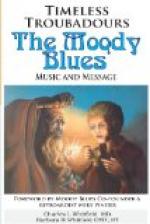Chanterai por mon corage
Que je vueill reconforter
Car avec mon grant damage
Ne quier morir n’afoler,
Quant de la terra sauvage
Ne voi nului retorner
Ou cil est qui m’assoage
Le cuer, quant j’en oi parler
Dex, quant crieront
outree,
Sire, aidies au
pelerin
Por cui sui espoentee,
Car felon sunt
Sarrazin.
De ce sui bone atente
Que je son homage pris,
E quant la douce ore vente
Qui vient de cel douz pais
Ou cil est qui m’atalente,
Volontiers i tor mon vis:
Adont m’est vis que jel sente
Par desoz mon mantel gris.
Dex, etc.
“I will sing for my heart which I will comfort, for in spite of my great loss I do not wish to die, and yet I see no one return from the wild [133] land where he is who calms my heart when I hear mention of him. God! when they cry Outre (a pilgrim marching cry), Lord help the pilgrim for whom I tremble, for wicked are the Saracens.
“From this fact have I confidence, that I have received his vows and when the gentle breeze blows which comes from the sweet country where he is whom I desire, readily do I turn my face thither: then I think I feel him beneath my grey mantle.”
The idea in the second stanza quoted is borrowed from Bernard de Ventadour—
Quant la douss’ aura venta
Deves vostre pais.
Vejaire m’es qu’eu senta
Un ven de Paradis.




